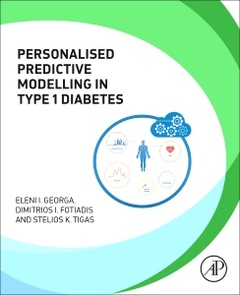Description
Personalized Predictive Modeling in Type 1 Diabetes
Authors: Georga Eleni I., Fotiadis Dimitrios I, Tigas Stelios K.
Language: English
Subjects for Personalized Predictive Modeling in Type 1 Diabetes:
Keywords
Adaptive learning; Adaptive models; Artificial pancreas; Assessment of glycemic control; Biosignals; Blood glucose regulation; Blood-glucose regulation; Closed-loop control of glucose; Cognitive computing; Compartmental models; Continuous glucose monitoring; Data-driven predictive models; Detection; Diabetes; Diabetes management; Electronic health records; Exogenous inputs; Glucose concentration; Glucose metabolism; Glucose monitoring and control; Glucose prediction; Hypoglycemia; Insulin therapy; Kernel methods; Learning and validation; Least mean square; Least squares; Linear and nonlinear dynamic models; Linear regression; Linear regression models; Linear system identification; Machine learning; Mechanistic models; Microbiome; Mobile computing; Model combination; Model selection; Neural networks; Omics; Online learning; Personal health records; Physiological signals; Physiological system modeling; Precision medicine; Prediction; Predictive modeling; Prevention; Recursive least squares; Regularization; System identification; Time series analysis; Type 1 diabetes; Types 1 and 2 diabetes
132.33 €
In Print (Delivery period: 14 days).
Add to cartSupport: Print on demand
Description
/li>Contents
/li>Readership
/li>Biography
/li>Comment
/li>
Personalized Predictive Modeling in Diabetes features state-of-the-art methodologies and algorithmic approaches which have been applied to predictive modeling of glucose concentration, ranging from simple autoregressive models of the CGM time series to multivariate nonlinear regression techniques of machine learning. Developments in the field have been analyzed with respect to: (i) feature set (univariate or multivariate), (ii) regression technique (linear or non-linear), (iii) learning mechanism (batch or sequential), (iv) development and testing procedure and (v) scaling properties. In addition, simulation models of meal-derived glucose absorption and insulin dynamics and kinetics are covered, as an integral part of glucose predictive models.
This book will help engineers and clinicians to: select a regression technique which can capture both linear and non-linear dynamics in glucose metabolism in diabetes, and which exhibits good generalization performance under stationary and non-stationary conditions; ensure the scalability of the optimization algorithm (learning mechanism) with respect to the size of the dataset, provided that multiple days of patient monitoring are needed to obtain a reliable predictive model; select a features set which efficiently represents both spatial and temporal dependencies between the input variables and the glucose concentration; select simulation models of subcutaneous insulin absorption and meal absorption; identify an appropriate validation procedure, and identify realistic performance measures.
Bioengineers, Clinicians, graduate and undergraduate students in the field of medicine and biomedical engineering.
Dimitrios I. Fotiadis received his Diploma degree in chemical engineering from National Technical University of Athens, Athens, Greece, in 1985 and the Ph.D. degree in chemical engineering from the University of Minnesota, Minneapolis, MN, in 1990. He is currently Professor at the Department of Materials Science and Engineering, University of Ioannina, Greece, and affiliated researcher at the Biomedical Research Dept. of the Institute of Molecular Biology and Biotechnology - FORTH. He is the Director of the Unit of Medical Technology and Intelligent Information Systems, Greece. He is the member of the board of Michailideion Cardiology Center. His research interests include modeling of human tissues and organs, intelligent wearable devices for automated diagnosis and processing/analysis of biomedical data.
Stelios Tigas is awarded PhD in Endocrinology from the University of Ioannina. Stelios Tigas international experience includes various programs, contributions and participation in different countries for diverse fields of study. Stelios Tigas research interests as an Associate Professor reflect in wide range of publications in various national and international journals
- Describes fundamentals of modeling techniques as applied to glucose control
- Covers model selection process and model validation
- Offers computer code on a companion website to show implementation of models and algorithms
- Features the latest developments in the field of diabetes predictive modeling




